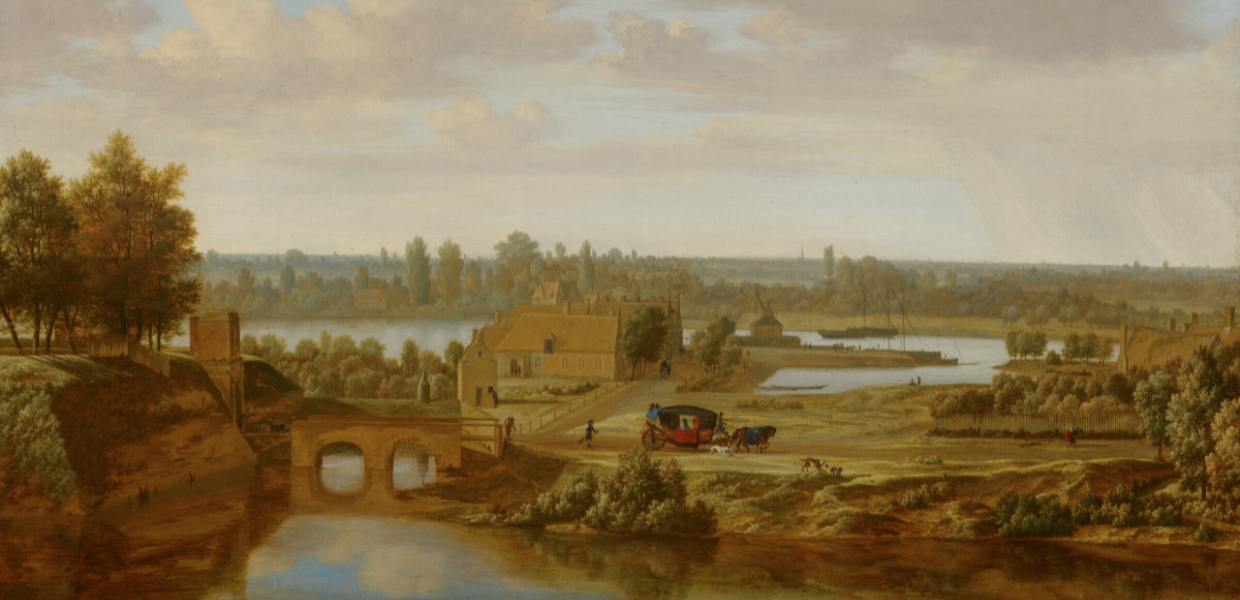Crowdsourcing with Artists4All at the RKD – Netherlands Institute for Art History
Thanks to crowdsourcing, researchers, experts and cultural heritage professionals from across the globe can now add to RKDartists&, one of the largest art databases in the world. In this post, Edda Japing, Digitisation Process Coordinator at the RKD, tells us about the Artists4All app which makes this possible, and how crowdsourcing can be an important element in research.

- Title:
- Panorama near Arnhem with the Rhine Gate
- Creator:
- Joris van der Haagen
- Date:
- 1649
- Institution:
- Mauritshuis
- Country:
- Netherlands
- Copyright:
- Public Domain
A huge artists database
The RKD – Netherlands Institute for Art History - is the world’s most important knowledge centre for the study of Dutch art. The RKD collects, catalogues, manages and makes information around the history of art available for heritage, educational and research organisations, auction houses, art dealers and individuals. The RKD’s unique collections and databases are accessible to all via www.rkd.nl.
The RKD manages a number of databases including RKDartists&, a repository containing detailed information about more than 350,000 Dutch and Flemish artists of all periods. Started in the 1990s, the database is an internationally recognised resource for art-historical research.
Expanding and maintaining RKDartists& up-to-date takes time and expertise, and is a considerable challenge for the RKD. In order to make sure that information is always relevant, new data must be constantly added and the literature section must list recent publications. A solution found by the RKD for this problem has been crowdsourcing, which allows it to benefit from external expertise. To facilitate crowdsourcing for the RKDartists& database, the RKD developed the Artists4All app, which was launched in November 2019.
How does Artists4all work?
Artists4All is an online application built using Axiell Collections, which permits changes to be made to the RKDartists& database. Collaborators are given an account which allows them to log in to the application. If they use Artists4all to change the record for an artist, or add a new record, this change is visible on the RKD’s website within a quarter of an hour.
In order to ensure that database fields are used correctly and include proper references, all changes are checked by an editor at the RKD. If the change is approved, the altered record is retained, but if the editor rejects a change, then an archived version of the record is restored. The expert will be informed why the change has been rejected and be assisted with correct data entry, so with experience, collaborators will see fewer interventions from the editorial team. Visitors to the database know if a record has been modified by an external expert as it is specified in the database entry.
Because RKD editorial checking concerns the form, not the substance of the data, collaborators have to meet certain criteria. All are experts in their field and employed by research and heritage organisations. Collaborators attend a workshop in advance about entering data into RKDartists& and working with Artists4All.
The RKD manages and monitors, but the database is built up in a collaborative and dynamic way. In the next few years, the number of collaborators will be increased, with the intention that the RKD gradually gains experience with this method of working and the editorial process. Plans are already in place to extend this practice to other databases. This approach to crowdsourcing in research could provide a model to other institutions or projects with the same need to provide reliable information to users.
Linked Open Data
In addition to the development of Artists4All, RKDartists& has also been made available as Linked Open Data via the a service developed by the Netwerk Digitaal Erfgoed (Dutch Digital Heritage Network), which is known as Termennetwerk (Network of terms). This offers a way for organisations to use data from RKDartists& in their own collection management system.
The process thus comes full circle for collaborating experts and heritage organisations. On the RKD website, they can click through directly to Artists4all to add information about an artist. Once changes have been saved and are visible in RKDartists& on the website, the improved data can be used within their own or external systems via the Linked Open Dataset. The first organisation to use this process will be the Literatuurmuseum (Literature Museum) in The Hague.
If your organisation is interested in contributing to RKDartists& through Artists4All, or wants to learn more about the set-up and functionality of the application, please send an email to: japing@rkd.nl
Artists4All has been developed with support from the Dutch Digital Heritage Network and Mondriaan Fund.
